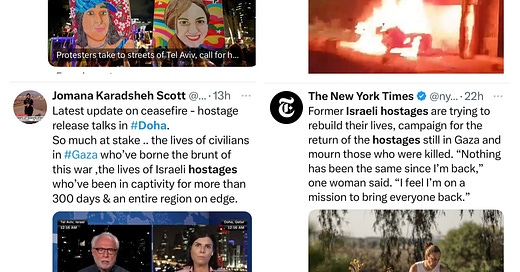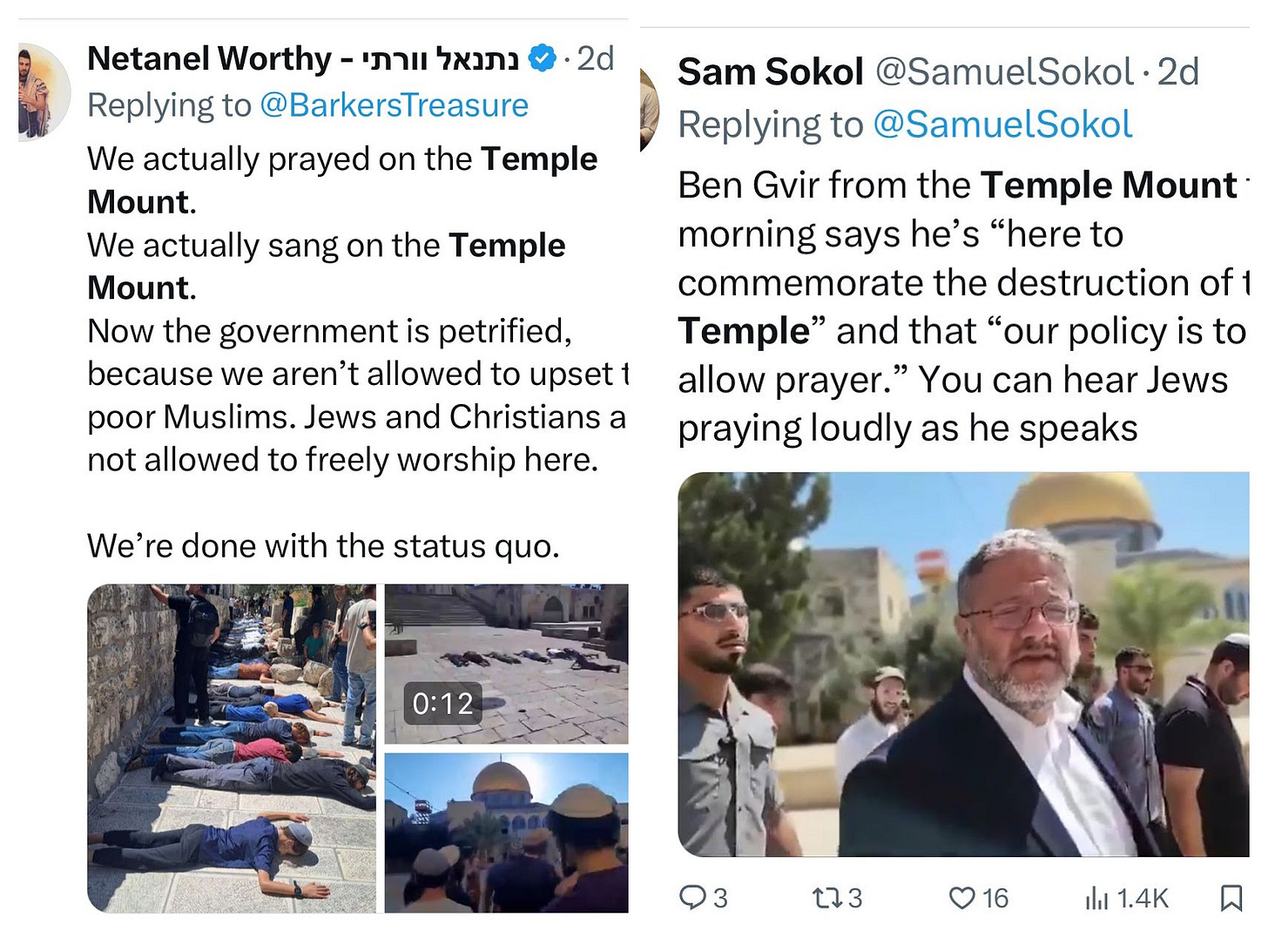Israel at War - Day 315
1. Doha Summit Convenes to Discuss Implementation of Ceasefire/Hostage Deal
Tensions in the Middle East escalate, and the threats of retaliatory attacks from Iran and Hezbollah are still present, albeit put on hold, as ceasefire/hostage deal negotiations resume in Doha, Qatar this week.
The Israeli delegation to Doha includes Mossad director, Shin Bet head, IDF top hostage negotiator and PM Netanyahu’s political advisor. The Hamas delegation will not participate in the summit, yet analysts say that this will not necessarily impede finalizing a ceasefire/hostage deal.
In the days leading up to the summit, the mediating countries – the U.S., Egypt and Qatar - put pressure on Israel and Hamas to reach a deal and resolve any outstanding issues to facilitate its implementation. In a statement issued several days ahead of the summit, they said: “there is no further time to waste nor excuses from any party for further delay. As mediators, if necessary, we are prepared to present a final bridging proposal that resolves the remaining implementation issues in a manner that meets the expectations of all parties.” The U.S. has made it clear that that it will publicly call out any party who attempts to torpedo the deal. In Israel, hostages’ families and their supporters held vigils in several locations around the country calling on PM Netanyahu to seal a hostage/ceasefire deal.
According to an Israeli media source, quoting U.S. officials, some progress was made on the first day of the summit.
2. Israel Under High Security Alert Waiting for Retaliation from Iran and Hizbollah
The high security alert situation in Israel started right after the killing of two senior leaders, the chief of staff of Hizbollah in Lebanon, for which Israel took full responsibility and the targeted killing of a senior Hamas operative, Ismail Haniya, in Tehran. Both Iran and Hizbollah promised to take revenge, but did not indicate when and where it will happen, which of course left all Israelis and the security institutions under a state of continuous uncertainty.
Earlier this week, the security alert was further heightened, as many intelligence agencies, backed by American intelligence, believed that retaliation will happen during the Jewish memorial day, Tisha B’av, when several disasters occurred including the destruction of the second Temple in the year 70 CE. Tisha B’av is a solemn day of fast and prayers (see below). Although the official spokespersons of the army and the government announced time and again that there was no change in their instructions, many decided to stay near shelters, just in case. Later the American administration, in an attempt to prevent a regional war, tried to link the success of the hostage negotiations with the retaliation: if there is progress in the negotiations in terms of a ceasefire, then both Iran and Hizbollah will refrain from retaliating.
Meanwhile, the war in Gaza continues. Earlier this week Israel bombed a school in the southern Gaza Strip. Palestinians reported 100 casualties many of them children. Israel argued that many of the dead were Hamas operatives. The Gaza Health ministry reported that more than 40,000 have been killed in Israel’s war in Gaza. The Gaza Health Ministry does not distinguish between civilians and combatants but aid workers and experts say the 40,000 figure is probably an undercount.
In Israel, the government informed all the evacuees from the southern communities, that left their homes on October 7th, and moved to hotels financed by the state, that state finance for their hotel stays will end on August 15th. Many protested and said that the situation is still fragile, that the area is still a war zone, that there is still ongoing widespread military activity in the border areI where the homes are, and that they refuse to take their children back to an insecure area.
Two days ago, more than 70 armed Jewish right-wing settlers entered the Palestinian village of Jit near Nablus, burned cars, and attacked Palestinians. According to Palestinians reports, one person was killed and another severely injured. The attacks, which appear to have gone beyond what has been done in the past, have been universally condemned across the Israeli political spectrum. The prime ministers office issued a statement saying “Those responsible for any offence will be apprehended and tried”. The Israeli military said police and army units intervened and arrested one Israeli for interfering with the police. From October 7, 2023 to August 5, 2024 alone, the United Nations Office for the Coordination of Humanitarian Affairs (OCHA) has recorded at least 1,143 settler attacks against Palestinians.
3. Fitch Credit Rating Agency Downgrades Israel
The agency announced earlier this week that it has downgraded the Israeli government's credit rating by one grade, from A+ to A, citing the continuation of the war in Gaza and “heightened geopolitical risks and military operations on multiple fronts," as the reasons for the downgrade. The agency also announced that the outlook for the Israeli economy has been declared "Negative", citing the possible continuation of the war well into 2025, and its implications for Israels’ economy as the reason. Fitch is the third rating agency to downgrade Israel’s credit rating in the past six months.
Finance Minister Smotrich (Religious Zionism) responded to this news in a post on the X social media network, saying: “Israel’s economy is strong, and we are navigating it correctly and responsibly”, adding that “the economic indicators point to the economy’s robustness and the high trust we have in the markets.” However, Fitch rating agency predicts that Israel’s budget deficit will reach 7.8% of its gross domestic product in 2024, compared with 4.1% in 2023.
Opposition head Lapid (Yesh Atid) slammed the government, specifically PM Netanyahu, and warned of an impending economic disaster. He further called out Minister Smotrich for lying to the public, citing the government’s reckless behavior before October 7th, 2023, its failure to diligently use surpluses left by his government, as well as the failure to pass a responsible budget.
4. Four Israeli Women and a Toddler Were Severely Attacked at an Israeli Settler Outpost in the West Bank
Four Israeli Beduin women from Southern Israel were traveling in the West Bank on their way north and entered an Israeli settler outpost on the way by mistake. The settlers attacked them, injured them, and in addition burned their car. As a result they all needed medical treatment. Two of the settlers were arrested for investigation. Later there was a discussion on the case in one of the Knesset committees, and a Knesset member of Otzma Yehudit (a far right religious Jewish party) Limor Son Har-melech insisted that they were not Israelis, that their car license plate was not Israeli and that the settlers were merely protecting themselves. It is important to say here that this was a complete lie, those women were Israelis and their car license plate was Israeli. Some Israeli officials, among them Benny Gantz, visited them in their village to express support and sympathy. Limor Son Har-melechs’ words reflect the sentiments expressed by many Religious Zionist supporters, while the event reflects the situation in the West Bank where Jewish settlers are predominantly a law unto themselves.
5. Tens of Jews Entered Temple Mount and Prayed Violating the Fragile Status Quo
Minister of National Security, Itamar Ben Gvir, made a pilgrimage to the Temple Mount in Jerusalems Old City on Tisha B’Av (a memorial day for the destruction of both Solomons Temple and the second Temple on that day). Jewish mythology believes that the temple was destroyed due to intra-communal conflict and hate. According to the status quo with the Muslim authority that administers the temple mount, where two Muslim holy sites, the Dome of the Rock and Al Asqa mosqu are situated, Jews are not allowed to pray on the site, which is the third holiest site for Muslims after Mecca and Medina. Jews pray at the Western Wall outside the site. Minister Ben Gvir insists on continually violating the status quo, and proving the sovereignty of Israel over the sanctuary. According to some Rabbinical rulings, Jews are not allowed to enter the site at all, for religious reasons. Other Rabbis, who belong to extreme right-wing religious Zionist groups like Ben Gvir, allow Jews to enter the site. Many fear that violating the status quo may trigger Muslim anger and violence in Israel and abroad. Ben Gvir announced that the site must be under the sovereignty of the State of Israel, while PM Netanyahu announced in a post that there is no change to the status quo, which has existed since 1967, whereby the Temple Mount is administered by the Islamic Waqf, the Muslim religious trust. The status quo is intended to preserve the religious and cultural significance of the site, while also maintaining order and security.









